Dems buck midterm trends; mixed results for LGBTQ candidates, pages 06 & 09


Dems buck midterm trends; mixed results for LGBTQ candidates, pages 06 & 09

In the early returns in key races statewide, California Governor Gavin Newsom handily won reelection as the Golden State’s Chief Executive.
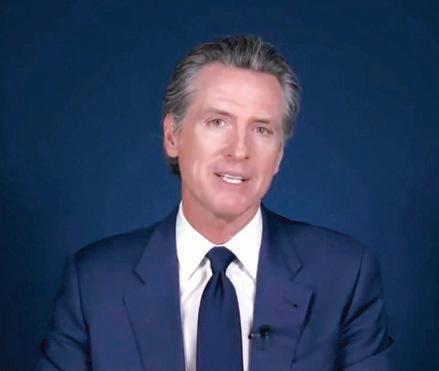
“We have governors that won their reelection tonight in other states that are banning books, that are banning speech, that are banning abortion, and here we are in California moving in a completely different direction. That’s a deep point of pride,” Newsom said Tuesday evening, after his projected win.
Newsom, who emphatically defeated a recall aimed at kicking him out of office last year defeated his Republican challenger Brian Dahle. In her race, California Lieutenant Governor Eleni Kounalakis beat back her Republican opponent Angela E. Underwood Jacobs.
In the race to serve out the remainder of Vice President Kamala Harris’s Senate term, incumbent U.S. Senator Alex Padilla defeated GOP challenger Mark P. Meuser, and Padilla also won election to a full term.
In the race for Attorney General, Rob Bonta defeated his Republican challenger Nathan Hochman.
Out Insurance Commissioner of California Ricardo Lara has defeated GOP challenger Robert Howell.
In the hotly contested race for mayor of the City of Los Angeles, the early returns showed, with less than 25% of voters counted, candidates Rep. Karen Bass and developer Rick Caruso were nearly deadlocked.
In the race for Los Angeles County Sheriff with an estimated 28% of votes counted, AP reports that former Long Beach Police Chief Robert Luna is currently leading incumbent Alex Villanueva in the race for L.A. County Sheriff.
“When I first started to run for this job…the priorities were clear, but simple. Number one was to keep the resi-
dents safe, to keep you and your family safe,” former Long Beach Police Chief Robert Luna, who is running for Los Angeles County Sheriff,” said to his supporters Tuesday night. Luna leads incumbent L.A. County Sheriff Alex Villanueva by more than 184,000 votes with 29% of the votes counted, AP reports.
California voters also approved Proposition 1, the Reproductive Freedom Act, amending the state’s constitution to affirm the right to abortion care and contraceptives.
Voters rejected dueling ballot measures to legalize sports betting in person and online. Proposition 26 would have legalized in-person sports betting on tribal lands and at four horse-racing tracks, while Proposition 27 would have allowed licensed tribes and gambling companies to offer online sports betting.
In Long Beach, Democratic candidate Robert Garcia won the election for California’s 42nd Congressional District. With this historic win, he is now the first out LGBTQ immigrant ever elected to Congress.
In a other closely watched U.S. Congressional races, Rep. Maxine Waters (D-CA 43rd District), according to the AP, holds a heavy lead against Republican challenger Omar Navarro.
Incumbent Rep. Katie Porter (D-CA 47th District) leads Republican challenger Scott Baugh by just over 19,000 votes.
Speaker of the House, Rep. Nancy Pelosi (D-CA 12th District), according to AP, maintains a heavy lead over Republican challenger John Dennis.
Rep. Adam Schiff (D-CA 28th District) holds a solid lead with more than 30% of the votes counted, the AP reports.
In Riverside County, gay Democratic challenger Will Roll-
ins was leading incumbent U.S. Rep. Ken Calvert, a Republican congressman for nearly 30 years. With 18.5% of precincts partially returning, Rollins was up by almost 9,000 votes, a margin of 56.5% to 43.5%.
Incumbent Rep. Barbara Lee (D-CA 12th District) is leading Republican challenger Stephen Slauson by more than 50,000 votes with just under 25% of votes counted.
Incumbent Rep. Eric Swalwell (D-CA 14th District) leads Republican challenger Alison Hayden by more than 20,000 votes with 26% of the votes counted, the AP reports.
BRODY LEVESQUE
The Iliad Bookshop, located 5400 Cahuenga at the corner of Cahuenga and Chandler Blvds. in North Hollywood, was the target of an alleged arson attack at around 11 p.m. last Thursday evening.
LA Fire firefighters responded to the blaze in front of the rear entrance which was fully engulfed after an unknown person or persons stacked up books and items left out by the store.
In interviews with KCBS2 LA, KABC7, and other media outlets, the bookshop’s owner Daniel Weinstein, said that a flyer, which he categorised as “terroristic,” was left at the scene of the blaze. The damage to the building was primarily to the entrance area with noticeable scorch marks, there was smoke damage inside as well. Weinstein added that the store’s iconic two live-in cats, Zeus and Apollo, were not harmed.
There was no information as to the extent of the damages to the store’s inventory.
In a GoFundMe started by the bookshop to repair and recover from the attack, Weinstein wrote: “We were very lucky: neighbors saw the flames and flagged down a passing firetruck; had the firefighters arrived mere moments later, the entire store would probably have
gone up. As it is, we suffered heavy damage to the main entry. The doors (which are metal) are still functional, but will need to be either replaced or fixed. We lost lighting fixtures, signage, and wood framing; we also suffered damage to the mural on the right side of the doors. Smoke filled the interior of the store, but we were able to rescue our two cats Zeus and Apollo and we’re hopeful that the damage to the books and fixtures is minimal.
We have high insurance deductibles so we need to cover the cost of replacing the exterior lights, sign, and trim, and touching up the mural. We expect the funds we’re looking for to be divided between repair costs and a mural artist.”
The Iliad Bookshop has been a fixture in the North Hollywood community for over 35 years. In a March 2019 profile article by Los Angeleno magazine writer Augustus Britton, the shoppe was described as “a cozy mix of librarial reverence and old lore magic. The walls are lined with literary memorabilia, most notably art by R. Crumb and posters of Bukowski alongside author obituaries from days past. An aged photograph showing Weinstein drowning in a pile of hardcovers hangs on the wall.”
Britton goes on to say: “Weinstein’s 10 employees are awesome. There are no better poetic words to describe them. One could say they all look like fictional characters. Grateful Dead fans, Philip K. Dick spies or Stendhal savants eating Chinese food at the counter while the shop’s spunky cats Zeus and Apollo — more nods to Greek mythology — climb over their shoulders.”
The fire is currently under investigation by LAFD arson investigators.
BRODY LEVESQUE








Los Angeles County Sheriff’s Department homicide investigators are continuing their investigation into the circumstances surrounding the death of singer-rapper Aaron Carter, 34, who was found unresponsive in his home.

Los Angeles County Sheriff’s deputies and EMS from L.A. County Fire Department’s Fire station 129, responded to the Carter residence at 42502 Valley Vista Drive Saturday morning at approximately 11:00 a.m.
According to LASD spokesperson Deputy Alejandra Parra, the person making the 911 call, later identified as the house sitter, stated “she found a male unresponsive in the bath tub.” She was advised by the dispatcher to begin cardio pulmonary resuscitation (CPR) prior to the deputies arrival.
Shortly after the deputies arrived, LACD Fire department EMS personnel arrived and pronounced the male (Carter) deceased at the scene. Representatives for Carter’s family confirmed the singer’s death but did not provide any immediate further comment.
“We are still in the process of accepting this unfortunate reality,” Carter’s fiancé, Melanie Martin said in a statement Saturday afternoon. “Your thoughts and prayers are greatly appreciated.”
The singer’s publicist released a statement noting: “The family has been notified and will be flying out to Los Angeles. Aaron worked very hard towards the end of his life in recovery, to be a good father and to make amends with his family.”
The singer-rapper rose to fame as an adolescent star singing and acting. Carter, the younger brother of the Backstreet Boys’ Nick Carter was an actor in film and television shows like “Lizzie McGuire” and “7th Heaven.”
He opened for the Backstreet Boys on a 1997 tour, ac-
cording to The Hollywood Reporter, and he did the same for Britney Spears, according to The Associated Press.
Carter is perhaps most well known, however, for his sophomore album “Aaron’s Party (Come Get It),” which was released in 2000 and has been certified triple platinum, KTLA reported.
It included the title track as its first single, as well as a cover of “I Want Candy” and a basketball-themed song “That’s How I Beat Shaq.” The parody song features an accompanying video with NBA icon Shaquille O’Neal in which the Hall of Famer loses a game of pickup to the scrawny preteen.
The teenage Carter was seen as a heartthrob who had several high-profile romances, including with fellow child stars Lindsay Lohan and Hilary Duff. In 2019, he publicly came out as bisexual, although he admitted he had only dated women.
Following his initial twitter post Carter appeared on an
episode of The Doctors, during which he confirmed he was bisexual, and that he would be open to dating a man if one “comes into my life and sparks an interest.”
He later appeared to have partially walked back his coming out as bisexual saying his remarks were misconstrued.
In a podcast for Hollywood Life, Carter was asked if he would ever date a man. The 30-year-old singer said no.
“It was more so just a story that happened when I was like 17 with somebody. And I can find men and women attractive, but when it comes down to it, I think it was a little misconstrued,” Carter said. “I see myself being with a woman and having kids. I want to have a family.”
“I keep telling people that. I don’t want it to be misconstrued too much just because I was open about a story,” he added.
He later seemed to reconsider claiming that he was ready to embrace his bisexuality and would be open to dating a man if one caught his interest. He also had plans to include his bisexuality in his upcoming music.
KTLA reported that the singer also had publicly battled addiction for many years, facing legal troubles and entering rehabilitation while continuing with his music career, according to E!.
In September of this year, he entered rehab for the fifth time so he could regain custody of his infant son, Prince, according to the Los Angeles Times.
He also publicly feuded with many, including his brother Nick, whom he accused of trying to put him under a conservatorship.
In 2019, he revealed on “The Doctors” that he was diagnosed with “multiple personality disorder, schizophrenia, acute anxiety and manic depression,” according to CNN.
BRODY LEVESQUE
Officials of Los Angeles County and the Los Angeles Arboretum Foundation had shovels in hand Friday, November 4, to break ground for the construction of a new Visitor Plaza at the Los Angeles County Arboretum and Botanic Garden. The $10 million project is designed to set new standards in visitor hospitality, horticultural beauty, and improved garden access.
“The Arboretum is a partnership venture between the Arboretum Foundation and the Los Angeles County Department of Parks and Recreation. The new Visitor Plaza will be a gateway for visitors from across L.A. County to enjoy the magnificent 127 acres,” Norma García-González, Director of L.A. County Parks and Recreation, said at the ceremony. “This bright new face for the Arboretum reflects the vastly increased community we serve and newfound appreciation for time spent in the natural world,” shared Richard Schulhof, Arboretum CEO.
It was a proud moment for former President and Honorary Arboretum Foundation trustee, Ken Hill, PhD, who was part of the community and fundraising effort to build the new entrance. “The best result from this endeavor was discovering thousands of
friends of the Arboretum who love the gardens and are happy to support its improvement,” he said.
L.A. County Supervisor Kathryn Barger, a supporter of the new project, was at the groundbreaking. The new entrance will add an Arrival Plaza, Welcome Plaza and Ticketing Pavilion within the footprint and re-adaptation of the existing mid-20th century modern complex. The project, funded by the Arboretum’s first capital campaign in 40 years, is the Arboretum’s largest improvement to date.
The Visitor Plaza is scheduled to be completed in 2023 during the Arboretum’s 75th Anniversary. More than 700,000 visitors a year enjoy the Arboretum, which is governed through a private-public partnership between the nonprofit Arboretum Foundation and the County Department of Parks and Recreation. Project design was completed by EPT Design, Dunbar Architecture and Hunt Design.
FROM STAFF REPORTSA three-judge panel of the 9th U.S. Circuit Court of Appeals in a 2-1 decision ruled this week that a beauty pageant can bar transgender women competitors. Upholding an earlier ruling from the U. S. District Court of Oregon in the case of Green v. Miss United States of America, LLC, the court found that that requiring the pageant to be inclusive of trans contestants would be a violation of its First Amendment right to free speech.
Anita Green, a trans woman, who has competed in multiple beauty pageants including Miss Montana and Miss Earth, filed an application to participate in the Miss USA pageant, but was rejected on the basis that the pageant’s rules specified that only “natural born females” can compete.
Green had applied in Oregon and filed the federal suit based on her allegation that the pageant’s rejection was a violation of the Oregon Public Accommodations Act’s (“OPAA”) prohibition against discrimination on the basis of gender identity. In its ruling the U. S. District Court found the pageant’s First Amendment right to free expression and free association eclipsed the OPAA.

In the 58-page opinion, 9th U.S. Circuit Judge Lawrence VanDyke, appointed to the federal bench by former President Trump, compared and contrasted the pageant’s requirement to that of Broadway composer and producer Lin-Manuel Miranda required protocols in casting his musical ‘Hamilton.’
Law & Crime noted: “The musical utilizes hip-hop music and lyrics to detail the rise and fall of Founding Father Alexander Hamilton and has garnered widespread attention from the public and critics alike,” VanDyke wrote and also attributed “some of the musical’s popularity” to “its casting choices,
namely the decision to cast the predominately white Founding Fathers with actors of color.”
VanDyke noted that creator Miranda’s casting decision “was widely—though not universally—applauded,” and included a footnote quoting an op-ed written by a University of Michigan student that questioned the messaging behind the choice of actors. Blogger Camille Moore wrote that despite Miranda’s aim to cast the Pulitzer Prize-winning show to reflect “America today,” the casting missed the mark in that in that it failed to acknowledge that even today, powerful figures would be rich, white men.
The judge continued, explaining that Hamilton’s mainly non-white cast makes an important statement about American history that is “integral” to the show’s message.
The ruling also noted “it is commonly understood that beauty pageants are generally designed to express the “ideal vision of American womanhood.” The panel held that the Pageant’s message cannot be divorced from the Pageant’s selection and evaluation of contestants. The Pageant would not be able to communicate “the celebration of biological women” if it were forced to allow Green to participate.
The First Amendment affords the Pageant the ability to voice this message and to enforce its “natural born female” rule.
The judges concluded that forcing the Pageant to accept Green as a participant would fundamentally alter the Pageant’s expressive message in direct violation of the First Amendment. The judge’ also pointed out that contrary to Green’s argument, it does not matter that the Pageant is a for-profit entity that engages in commerce. That alone is not
enough to strip the Pageant of its First Amendment rights.
The ruling also noted that the application of the OPAA in this context lacks the compelling state interest. The State of Oregon has offered only “eliminating discrimination against LGBTQ individuals” as a compelling interest, but this broad formulation alone cannot suffice. The courts have a long-standing hesitation to enforce anti-discrimination statutes in the speech context. Application of the anti-discrimination law to the Pageant here would necessarily impact its message. Applying the proper Supreme Court guidance in this case required prohibiting the application of the OPAA to eliminate the Pageant’s “natural born female” rule.
Writing in dissent, 9th Circuit Judge Susan P. Graber, appointed to the Federal bench by former President Bill Clinton slammed the majority for its “radical departure” from “well-settled” legal rules.
Law & Crime reported: Under the doctrine of “constitutional avoidance,” Garber explained that the court should have first determined whether OPAA even applied to Green’s claim before diving into First Amendment analysis. Graber reprimanded the majority for its “insistence in reaching an unnecessary constitutional issue,” and reminded her fellow judges that constitutional avoidance is, and has long been, a bedrock judicial principle.
Graber then used VanDyke’s proffered examples in a logical assault on the majority’s ruling: given the nature of performances, a solid argument could be made that OPAA does not even apply to beauty pageants. Therefore, VanDyke’s Hamilton analogy does more to undermine the majority’s ruling than to support it.
Graber wrote: “Choosing actors for a production of Hamilton, making a sequel to an 80s cinema classic, and assembling a troupe of Beyonce’s backup dancers are intensely selective processes that cannot be said to be open to the public as contemplated by the OPAA. It is highly unlikely that the OPAA would apply to the selection of performers for those roles.”
BRODY LEVESQUEThe Florida Boards of Medicine and Osteopathy finalized their proposed rules to restrict gender affirming care for transgender youth in the state which, when in effect, will be the only ban on gender-affirming in effect in America. Similar measures in Alabama and Arkansas are currently blocked in court.
The board voted 6-3 (with five others not present) on Friday to adopt a new standard of care that forbids doctors to prescribe puberty blockers and hormones, or perform surgeries, until transgender patients are 18. Exceptions will be allowed for children who are already receiving the treatments.
The boards landed on similar language that would bar future puberty blockers, hormone replacement therapy and extremely rare surgical interventions as treatments for gender dysphoria in youth.
That language included an exception for young people already receiving these treatments for gender dysphoria prior to the effective date of the rules. However, they disagreed on allowing nonsurgical treatments for gender dysphoria to
continue through Institutional Review Board-approved clinical trials.
The Board of Osteopathy approved language allowing transgender youth to access gender-affirming care via those studies while the Board of Medicine rejected that proposal, paving the way for different rules governing MDs and DOs (Doctors of Osteopathy). No such IRB-approved studies are currently being conducted in Florida.
Once the rules are posted, advocates have the opportunity to request an additional hearing and workshop from the Boards, a move that groups have indicated they will take. If denied, the rules move to a 21-day period in which the public can submit written comments before a final, procedural vote by the Boards.
The New York Times reported that before the medical board decided to craft the new standard, members received personal calls from the state’s surgeon general, Dr. Joseph Ladapo, urging them to do so. Earlier this year, Florida became one of at least nine states to bar Medicaid coverage
of gender-affirming care, affecting thousands of low-income adults and children.
“With young lives on the line, another state agency has placed the political ambitions of Ron DeSantis over its duty to protect Floridians,” said Nikole Parker, Equality Florida Director of Transgender Equality. “These rules, as written, put transgender youth at higher risk of depression, anxiety, and suicidality. Those are the facts purposely ignored by a Board of Medicine stacked with DeSantis political appointees who have put their toxic politics over people’s health and wellbeing. Transgender Floridians exist. We are part of this community. Gender-affirming care is lifesaving care — and it is care that is supported by every major medical organization, an overwhelming majority of medical providers, and should be left to young people, their families, and their doctors. Not politicians. Shame on the Florida Boards of Medicine and Osteopathy for trading the suffering of transgender youth and their parents for cheap political points.”
BRODY LEVESQUE
With Republicans expected to wrest control of the U.S. House after the midterms, LGBTQ advocates are turning their focus toward priorities for the lame duck session before the next Congress is seated – while bracing for a hostile legislative environment next year. (Visit washingtonblade.com for updated election results.)
In the near term, a Republican majority in the House will put pressure on Senate Democrats to bring a floor vote to codify protections for same-sex marriage before the year’s end.
The House passed the Respect for Marriage Act (RFMA) this summer, which would require the federal government to recognize preexisting marriages between same-sex couples – a safeguard to gird against some of the consequences that would result if the conservative U.S. Supreme Court reverses or substantially weakens its landmark marriage equality ruling.

“All eyes are on the RFMA,” said Albert Fujii, press secretary for the LGBTQ Victory Fund, which works to elect pro-choice LGBTQ candidates. Clearing the 60-vote threshold in the upper chamber during this legislative session is reasonably likely given that a key number of Republican senators may support the bill because they are slated to retire or lose their reelection bids, Fujii told the Washing-
ton Blade on Tuesday.
Should Republicans secure a majority in the House, Minority Leader Rep. Kevin McCarthy (R-Ca.) is expected to become Speaker, a position for which he is backed by former President Donald Trump.
The Bakersfield congressman said that if his party takes the House, they will reinstate extremist anti-LGBTQ Rep. Marjorie Taylor Greene’s (R-Ga.) right to serve on committees in the chamber. Greene was stripped of her committee assignments last year following revelations that she spread conspiracy theories and endorsed violence against House Speaker Nancy Pelosi (D-Ca.) on social media.
A Republican majority in the House would also mean greater chances of success for anti-LGBTQ legislation that has already been introduced, such as a federal version of Florida’s Parental Rights in Education (“Don’t Say Gay”) bill and Greene’s measure to criminalize healthcare providers who offer medically necessary care for transgender minors, Fujii said.
“With McCarthy as speaker, those bills have a greater chance of moving forward,” with members voting them out of committees and calling for floor votes, Fujii said.
Republicans only needed a net gain of five House seats in the midterms to win a majority. FiveThirtyEight, a site that aggregates and analyzes polling data, estimated that 10 Republican candidates faced odds of 90% or greater to pick up new seats.
Some of those represent districts that were redrawn to include more GOP voters, while others – in Colorado, Florida, Montana, and Texas – represent newly created districts that were expected to go red.
According to FiveThirtyEight, there were 19 House seats not currently occupied by Republican members that Republican candidates were favored to win, while Democrats were expected to flip only as many as five red seats.


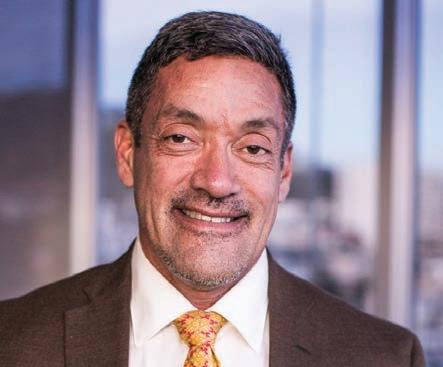
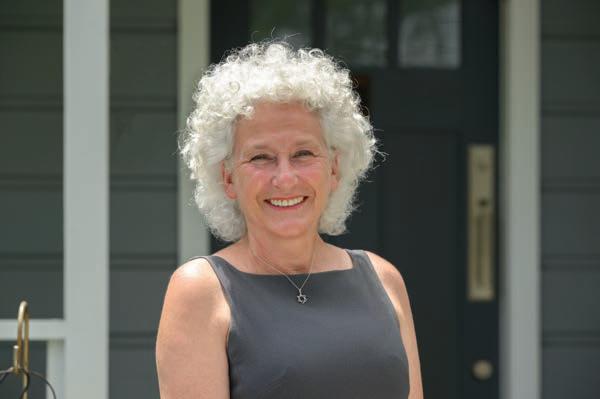
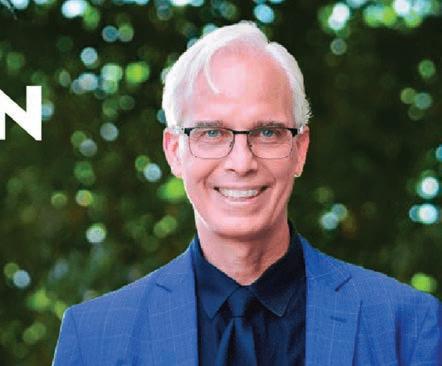
Progressive LGBTQ groups celebrated the pro-equality LGBTQ candidates running in key midterm races across the country on Tuesday, several of whom claimed victory as Election Day stretched into the night.
Becca Balint and Maura Healey were among the first candidates whose races were called, both becoming the first women and the first LGBTQ people elected to, respectively, represent Vermont in Congress and serve as governor of Massachusetts.

The LGBTQ Victory Fund, which supports pro-choice LGBTQ candidates, toasted the candidates’ success “shattering lavender and glass ceilings.”
“The future of LGBTQ equality and women’s rights were on the ballot — and Vermonters delivered tonight,” Victory Fund President Mayor Annise Parker said in a press release on Balint’s win. “For nearly a decade, Becca led efforts to pass meaningful legislation to increase fairness and equity within Vermont. Now, she is ready to do the same in Congress.”
In a press release announcing Healey’s victory, Parker said, “In the face of so much hate and intolerance sweeping our nation, her win is a sign — especially to LGBTQ kids in desperate need of hope — that LGBTQ people have a place in American society and can become respected public leaders.”
LPAC, a group that supports women and nonbinary LGBTQ candidates running for public office, also published press releases celebrating Healey and Balint on Tuesday afternoon.
Just before midnight, the Victory Fund called Robert Garcia’s victory for California’s 42nd Congressional District. Garcia will be the first openly gay immigrant elected to Congress.
“We are confident Robert’s deep policy experience and ability to build strong, diverse coalitions will make him an exceptional
legislator,” Parker said. “His win tonight will inspire countless other LGBTQ and first-generation Americans to pursue careers in public service.”
Democrat and LGBTQ ally Wes Moore also made history on Tuesday, becoming Maryland’s first Black governor-elect in his race against Donald Trump-backed far-right candidate Dan Cox, while gay Colorado Gov. Jared Polis and U.S. Rep. Chris Pappas (D-N.H.) won their reelection bids.
Democrat and LGBTQ ally Maxwell Alejandro Frost, 25, became the first Generation Z candidate to win a congressional seat, where he will represent Florida’s 10th Congressional District in the House.
Per pool reports, by 11:30 p.m., President Joe Biden made congratulatory calls to Healey; Polis; Senate Majority Leader Chuck Schumer (D-N.Y.); U.S. Sens. Tammy Duckworth (D-Ill.) and Richard Blumenthal (D-Conn.); Democratic Rhode Island Gov. Dan McKee; Democratic Illinois Gov. J.B. Pritzker; Democratic Maine Gov. Janet Mills; U.S. Sens. Michael Bennett (D-Colo.), Maggie Hassan (D-N.H.) and Alex Padilla (D-Calif.); U.S. Reps. Lisa Blunt Rochester (D-Del.), Abigail Spanberger (D-Va.) and Jennifer Wexton (D-Va.), U.S. Sen. Chris Van Hollen (D-Md.), D.C. Mayor Muriel Bowser), U.S. Sen.-elects Peter Welch (D-Vt.) and Seth Magaziner (D-R.I.), and Pennsylvania Gov.-elect Josh Shapiro.
Meanwhile, Tina Kotek is locked in a close race for Oregon’s governorship whose outcome may not be clear until later this week. If elected, she would join Healey as the nation’s first openly lesbian governor.
And the fates of LGBTQ candidates in closer races for seats in the lower chamber are still unclear. These include U.S. Reps. Sean Patrick Maloney (D-N.Y.) and Sharice Davids (D-Kan.), who
are running for reelection, along with Jamie McLeod-Skinner and Will Rollins, who are competing for House seats in Oregon and California, respectively. Maloney, the DCCC chief, trailed Mike Lawler as of Wednesday morning and is expected to lose his bid for re-election.
Heather Mizeur, who would have been Maryland’s first openly lesbian member of Congress, conceded her defeat Tuesday evening to incumbent Republican Maryland Congressman Andy Harris.

A historic number of LGBTQ candidates ran for elected office this year, advocacy groups said. The Victory Fund endorsed 411 people in races in 49 states, D.C., Guam, and the U.S. Virgin Islands.
The Human Rights Campaign, America’s largest LGBTQ advocacy group, also touted the diverse pool of candidates in the midterms, citing the record numbers of transgender and gender nonconforming people who ran this year. The organization also noted that the electorate is composed of more LGBTQ voters than ever before.
“We will continue to stand and fight every day alongside our allies and partners across the country, in support of a pro-democracy, pro-equality, and pro-choice future,” Interim HRC President Joni Madison said in a press release from the organization.
CHRISTOPHER KANEThe board of directors of the Trevor Project, which describes itself as the world’s largest suicide prevention and mental health organization for LGBTQ young people, has “elected to make a change in leadership” by removing from office it’s chief executive officer and executive director since 2017, Amit Paley, according to a statement released to the Washington Blade.
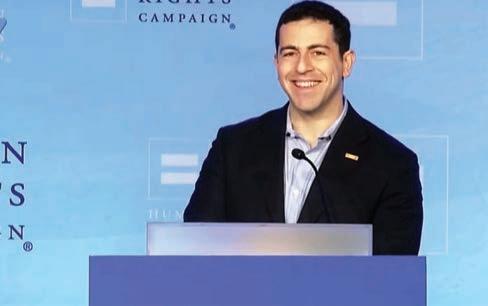

The Blade reached out to Trevor Project for comment after the publication Teen Vogue broke the news about Paley’s dismissal in a Nov. 4 story. The story cited an unidentified source familiar with the organization as saying the dismissal was brought about following “staff dissatisfaction, particularly as it relates to the organization’s quick large-scale growth and the burden it put on employees.”


In its statement to the Blade, which is identical to the one it sent to Teen Vogue, Trevor Project says in recent years it has struggled to provide its services for LGBTQ youth at risk for suicide in the midst of a hostile political climate in which LGBTQ youth and their families are under attack.
“The Trevor Project is currently facing a period of transition, rethinking how to sustainably grow our 24/7 crisis services to respond to the public health crisis of LGBTQ youth suicide and address the mental health disparities impacting these youth,” the statement says.
“In 2017, the organization averaged less than 200 inbound crisis contacts per day; in 2022, it’s averaging more than 2,000 crisis contacts per day,” the statement continues.
“This intense climate has led to significant stress on our organization, and many members of our staff have raised concerns about workplace well-being, professional development, prioritization performance metrics and resourcing compensation — particularly as they impact our BIPOC [Black, indigenous and people of color], transgender, nonbinary and disabled team members,” the statement says.
“While a comprehensive, independent review of the Trevor Project is being conducted, the board of directors elected to make a change in leadership,” it says, while making no specific mention that it dismissed Paley.
In response to a request by the Blade for comment, Paley arranged for a communications firm representing him to send the Blade the same statement he released to Teen Vogue.
“It has been the honor of a lifetime to lead the Trevor Project’s life-saving team for over five years,” Paley’s statement says.
It points out that under his tenure, the organization expanded its services by launching a “24/7 digital crisis service, created a ground-breaking research department, expanded the world’s largest campaign to end conversion therapy and grew our team from 50 employees to over 500.”
The statement, which makes no mention of the reported concerns raised by employees, concludes by saying, “the Trevor Project’s vital work is needed now more than ever, and I will always remain deeply committed to the organization’s vision of a world where all LGBTQ young people see a bright future for themselves.”
The Trevor Project’s statement, meanwhile, says until a permanent CEO is identified, Peggy Rajski, one of Trevor Project’s founders and longtime board member, will serve as interim CEO. It says Gina Muñoz, the board’s chair emeritus, will serve as special assistant to the interim CEO.
Teen Vogue reports in its Nov. 4 story that two sources familiar with the Trevor Project said at some point prior to Paley’s removal, more than 200 employees signed a letter to the board expressing dissatisfaction with Paley’s leadership.
An earlier article by Teen Vogue published on July 25 reports that some staff members at that time were calling on Paley to resign after news surfaced that he worked prior to joining the Trevor Project for the corporate consulting firm McKinsey and Co. helping the pharmaceutical company Purdue Pharma increase its sales of opioid drugs.
With many LGBTQ youth, along with other young people, dying from the overdose of opioid drugs across the country, some of the Trevor Project staffers thought it was hypocritical for Paley to join the Trevor Project as CEO shortly
Republican Florida Gov. Ron DeSantis on Tuesday defeated Democrat Charlie Crist in the state’s gubernatorial election.
DeSantis as of 8:12 p.m. ET was ahead of Crist by a 57.541.9 percent margin with 74 percent of the total number of votes counted.
DeSantis, who signed Florida’s “Don’t Say Gay” law earlier this year, narrowly defeated Democrat Andrew Gilliam in 2018. DeSantis, who is a former congressman, is expected to run for president in 2024.
 MICHAEL K. LAVERS
MICHAEL K. LAVERS
after promoting the sale of opioids, the Teen Vogue article reports.
The article reports Paley sent an email to the staff after news about his links to opioid sales surfaced, stating, “If I knew then what I know now, I would not have agreed to do any consulting work for [Purdue] and I regret that I did.”
At the time Paley became Trevor Project’s CEO in 2017 and during his first few years there, Trevor Project had offices in West Hollywood, Calif., and New York City, with a smaller office in D.C. But according to spokesperson Tali Mackay, currently, “the Trevor Project is fully remote, and we do not have physical offices.”
One former employee who spoke to the Blade on condition of not being identified said most concerns raised by staff members about Paley were not because he wanted to expand the Trevor Project’s programs to meet the needs of a growing number of clients.
The main concern, the former staffer said, was his perceived inability or unwillingness to address the needs of the staff, including transgender staff members who felt their specific needs weren’t being met.
“
It’s hard to make that kind of growth,” the former staffer said. “And I think he had a vision, but that vision had to turn inward more than outward sometimes.”
Both Paley and the Trevor Project officials declined to comment further than what they said in the statements they released, their respective spokespersons said.
LOU CHIBBARO JR.









InterPride, a global organization representing more than 400 Pride organizations in at least 70 countries, announced last week that it has selected D.C.’s Capital Pride Alliance to host WorldPride 2025 in D.C.
The international Pride event, which is usually held every two years, draws thousands of participants from throughout the world to the host city.
Capital Pride Alliance submitted a bid to host WorldPride 2025 in September 2021 but lost the bid to an LGBTQ organization in Taiwan that proposed holding the event in the Taiwanese port city of Kaohsiung.
But in a surprise development, the Taiwanese group Kaohsiung Pride announced in August of this year that it withdrew its bid and abruptly cancelled its plans for hosting the event in Taiwan.
That immediately raised the question of whether InterPride would reopen the bidding process or select D.C.’s Capital Pride Alliance, which was the runner up group in the 2021 bidding.
In its announcement late last week, InterPride said the question of what to do about WorldPride 2025 was discussed at great length at its Annual General Meeting and World Conference in Guadalajara, Mexico, held Oct. 27-30.
“The membership was asked to decide whether the event should not take place in 2025, or if it should be awarded to the first runner-up, the Capital Pride Alliance (CPA) from Washington, D.C., U.S.A.,” the InterPride announcement says.
“Seventy-four percent (74 percent) of the membership voted to award WorldPride 2025 to CPA, while 19 percent voted not to hold World Pride in 2025 and 7 percent abstained,” according to the announcement.
“The Capital Pride Alliance is thrilled and honored to have been awarded the privilege of hosting World Pride 2025,” Capital Pride Alliance Executive Director Ryan Bos said in a statement. “We thank InterPride for this wonderful opportunity to share the best of the Washington region with our friends from around the globe and to have them participate with us on the 50th anniversary of Pride in D.C.,” Bos said.
In a separate statement, InterPride Co-Presidents Linda DeMarco and Hadi Damien congratulated Capital Pride Alliance for being named host of WorldPride 2025.
“We are glad the Capital Pride Alliance was still willing to host WorldPride 2025, and we welcome the vote of confidence the membership put in them,” the two said. “We all trust
the Capital Pride Alliance has what it takes to deliver a robust WorldPride.”
D.C. Mayor Muriel Bowser, who expressed strong support for the Capital Pride Alliance’s 2021 bid to host WorldPride, told the Washington Blade in a statement on Thursday that she looks forward to WorldPride being held in D.C.
“Pride in D.C. is a manifestation of our DC values — an opportunity for people to celebrate themselves & the diversity of our community,” the mayor said. “What better way to celebrate 50 years of Pride in D.C. than with the largest LGBTQ+ event in the world. See you at the pride of our lifetime in 2025.”
In its statement announcing D.C. had been selected to host WorldPride 2025, InterPride also announced a WorldPride would be held in 2026 and its members voted by a margin of 59 percent to 37 percent to select Amsterdam in the Netherlands over Orlando, Fla., to be the host city. The announcement says the two competing groups were Pride Amsterdam and Come Out with Pride of Orlando.
An official with Pride Amsterdam says in the statement that, among its activities planned for WorldPride 2026, will be a commemoration honoring the victims of the 2016 Pulse Nightclub massacre in Orlando, in which 49 mostly LGBTQ people were shot and killed by a lone gunman who targeted the gay nightclub. Police shot and killed the gunman.
Bos has said that among the events planned for WorldPride 2025 will be a celebration of the 50th anniversary of D.C.’s first LGBTQ Pride event in 1975, which began as a block party near Dupont Circle.
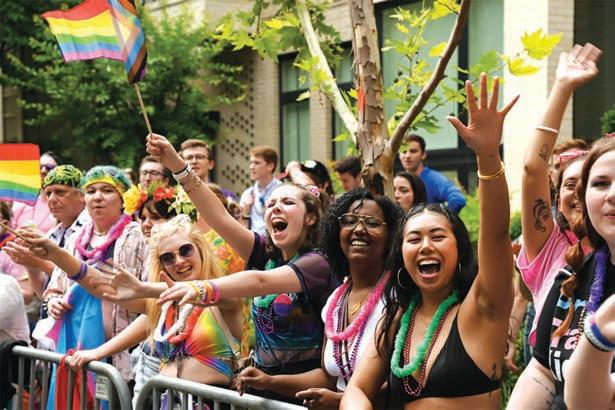
In a statement released on Friday, Capital Pride Alliance says the proposed dates for WorldPride 2025 are May 22 through June 8.
“WorldPride DC 2025 will feature a vibrant and innovative slate of cultural programs that highlight the best that Washington, D.C. has to offer,” the statement says. “It will include a human rights conference, in partnership with the 34th annual D.C. Black Pride,” it says.
“We would like to thank the members of our team who put in countless hours to advocate on behalf of Washington, D.C., in addition to our many local and national LGBTQ+ organizations, local businesses, government agencies, and our corporate advocates who provided support for the bid,” said Ashley Smith, president of the Capital Pride Alliance board of directors.
LOU CHIBBARO JR.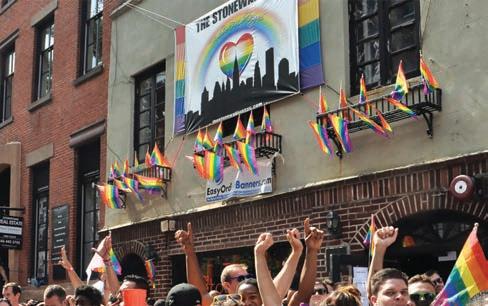
The National Trust for Historic Development has chosen the New York City LGBT Historic Sites Project as the recipient of its Trustees Award for Organization Excellence.
The LGBT Historic Sites Project is one of nine historic preservation-related organizations that were recognized with awards at a Nov. 4 virtual ceremony that was available to the public.
“The NYC LGBT Historic Sites Project is a nationally recognized and influential cultural heritage initiative and educational resource that identifies and documents diverse extant LGBT sites from the 17th century to 2000,” the announcement says.
“The only permanent organization of its kind in the U.S., the project staff have created an interactive website, National Register nominations, publicans and programs and school educational materials, among other resources,” the announcement continues.
‘Sitting at the intersection of historic preservation and social justice, the organization has been particularly eager to doc-
ument LGBT sites associated with women and Black, Asian, Latinx, trans and gender-variant communities,” according to the announcement. “In the near future, they hope to prioritize local sites of LGBT history associated with Indigenous and Two-Spirit peoples,” it says.
In its announcement, the National Trust for Historic Preservation says its National Preservation Awards ceremony is held each year during its annual PastForward Conference, which was held virtually on Nov. 4.
“Each year at the PastForward Conference we come together to recognize those making a real difference in historic preservation,” said Paul Edmondson, president and CEO of the National Trust for Historic Preservation. “This year’s recipients embody not just the preservation of American History, but also demonstrate how preserving historic places can play a key role in addressing critical issues of today, including climate change, equality and housing,” Edmondson said.
LOU CHIBBARO JR.
have been together for 20 years, married for over a decade, and are raising two beautiful children together. They are featured in an ad produced by GLAAD and Family Equality now running nationwide.
When we met 20 years ago, neither of us could have imagined the life we now share. We have been inseparable ever since and are happily — and legally — married, with two exceptional children. Our relationship is rooted in love, respect and commitment and is more resilient because of hard-won gains and painful losses.
LGBTQ couples and our marriages have the support of an overwhelming majority of Americans. Now we are speaking out in a new campaign to encourage all who support us to speak up.
When the Supreme Court overturned Roe v. Wade, tossing out rights Americans have had for almost 50 years, we immediately saw the threat. Our rights will likely be the next to go, as laid out in the concurring opinion urging the court to reconsider Obergefell. The U.S. Senate then delayed a vote on codifying marriage equality until after the election. Our rights as a family are in the hands of judges and voters, a reality most couples never have to face.
But our love story is as extraordinary and ordinary as any other. We serendipitously met while sitting one in front of the other at a concert in 2002. We got engaged three years later on Christmas Eve 2005, with a “downon-one-knee” proposal, and a scavenger hunt leading to two silver rings hung from a crystal cross tree ornament. We began our shared journey toward becoming a family after popping the question: Would you do me the honor of spending the rest of your life with me? The crystal cross is the fi nal ornament we place on our Christmas tree each year with our children.
We had a quintessential chapel wedding in December 2007. Our parents walked us down the aisle, and our sisters and two best friends stood with us to witness our commitment, surrounded by family and close friends. Our wedding was not yet a legal marriage but it had every element of meaning important to any couple.
In 2011, we expanded our family through adoption. Despite the birth family choosing us as a couple, our state of residence considered us nothing more than roommates. One of us became our son’s legal adoptive parent, while the state relegated the other to the status of “other adult in the household.”
The fear and anxiety we faced as a committed couple,
living in a state without marriage equality, led us to travel to Washington, D.C., in 2012 to make our marriage legal. After many conversations with each other and family, we decided to relocate to a state with marriage rights in 2014 — a choice we realize not all families can make. We started over with a young child, a new home and employment and no family and friends support system.
We worked with a local attorney to secure legal recognition for the non-adoptive parent, a process that involved legal fees, paperwork, and patience. We also amended our son’s birth certifi cate to include us both as his parents. In 2015, we expanded our family again when we welcomed our second child, whom we could adopt jointly as a married couple.
We felt secure returning to raise our sons near family in 2015, following the Obergefell ruling. It seems ancient history to think of all the steps we had to take to get the same legal recognition and protections as any other couples and parents. Since Obergefell, families of all shapes and sizes have been increasingly accepted and welcomed in communities.
Still, there is no doubt the court can take marriage rights away and will try. The risk to our family and all LGBTQ families is crystal clear and deeply troubling. For us, if the Supreme Court overturns Obergefell, a dormant constitutional amendment banning the legal recognition of same-sex marriage in our current state of residence would immediately invalidate the legal recognition of our marriage.
We got married because we love each other and we want to be there for each other. Our marriage helps protect our kids and us. We never want to worry about one of us not being allowed in a hospital room, being eligible for survivor benefi ts, or, God forbid, having our kids not seen as part of our family. All families deserve love and protection.
Equality for all families should not be a partisan issue. LGBTQ families already have the support of people from all parties. By sharing our story, we want to alert every LGBTQ and ally American to take action to protect our family and our marriage. It’s time for politicians to catch up.
ADDRESS
8237 Blackburn Avenue Ste. 201, Los Angeles, CA 90048 PHONE 310-230-5266
E-MAIL tmasters@losangelesblade.com INTERNET losangelesblade.com PUBLISHED BY Los Angeles Blade, LLC
PUBLISHER
TROY MASTERS tmasters@losangelesblade.com 310-230-5266 x8080 (o), 917-406-1619 (c)
SALES & MARKETING SALES EXECUTIVE CHRIS WILMORE cmwilmore@losangelesblade.com 310-230-5266 x9461
NATIONAL ADVERTISING RIVENDELL MEDIA sales@rivendellmedia.com, 212-242-6863
MARKETING DIRECTOR
STEPHEN RUTGERS srutgers@washblade.com, 202-747-2077 x8077
EDITORIAL CONTRIBUTING WRITER KAREN OCAMB karenocamb@losangelesblade.com
NATIONAL EDITOR
KEVIN NAFF kna @washblade.com, 202-747-2077 x8088
EDITOR AT LARGE BRODY LEVESQUE California
CONTRIBUTORS
MICHAEL K. LAVERS, TINASHE CHINGARANDE, ERNESTO VALLE, YARIEL VALDÉS GONZALEZ, PARKER PURIFOY, CHRISTOPHER KANE, AUSTIN MENDOZA, JOHN PAUL KING, JOEY DIGUGLIELMO, CHRIS JOHNSON, LOU CHIBBARO JR., REBEKAH SAGER, JON DAVIDSON, SUSAN HORNIK, CHANNING SARGENT, SAMSON AMORE, CHRISTOPHER CAPPIELLO, MICHAEL JORTNER, DAN ALLEN, SEAN SHEALY, SCOTT STIFFLER, RHEA LITRÉ
CREATIVE DESIGN/PRODUCTION AZERCREATIVE.COM
DISTRIBUTION
CHRISTOPHER JACKSON, 562-826-6602
All material in the Los Angeles Blade is protected by federal copyright law and may not be reproduced without the written consent of the Los Angeles Blade. e sexual orientation of advertisers, photographers, writers and cartoonists published herein is neither inferred nor implied. e appearance of names or pictorial representation does not necessarily indicate the sexual orientation of that person or persons. Although the Los Angeles Blade is supported by many ne advertisers, we cannot accept responsibility for claims made by advertisers. Unsolicited editorial material is accepted by the Los Angeles Blade, but the paper cannot take responsibility for its return. e editors reserve the right to accept, reject or edit any submission. A single copy of the Los Angeles Blade is available from authorized distribution points, to any individual within a 50-mile radius of Los Angeles, CA. Multiple copies are available from the Los Angeles Blade o ce only. Call for rates. If you are unable to get to a convenient free distribution point, you may receive a 26-week mailed subscription for $195 per year or $5.00 per single issue. Checks or credit card orders can be sent to Phil Rockstroh at prockstroh@washblade.com. Postmaster: Send address changes to the Los Angeles Blade, PO BOX 53352 Washington, DC 20009. e Los Angeles Blade is published bi-weekly, on Friday, by Los Angeles Blade, LLC. Rates for businesses/institutions are $450 per year. Periodical postage paid at Los Angeles, CA., and additional mailing o ces. Editorial positions of the Los Angeles Blade are expressed in editorials and in editors’ notes as determined by the paper’s editors. Other opinions are those of the writers and do not necessarily represent the opinion of the Los Angeles Blade or its sta To submit a letter or commentary: Letters should be fewer than 400 words; commentaries should be fewer than 750 words. Submissions may be edited for content and length, and must include a name, address and phone number for veri cation. Send submissions by e-mail to tmasters@losangelesblade.com.


Leather bar Touché, located in Rogers Park in Chicago, is under fire after allowing Jerry Halliday, a white puppeteer, to perform a transphobic and racist act with a Black puppet named “Sista Girl” during Touché’s 45th anniversary party.
Halliday’s distasteful 45-minute set trafficked in racial stereotypes and mocked Black women and Black vernacular.
At one point, “Sista Girl” asks the predominantly white audience, “fellas you wanna know the quickest way to get a man’s attention? Just go in the back of the room and go yeahhhh.” Halliday then lifts Sista Girl’s skirt and exposes her private area, which he calls an “afro puff” and likens to a “Brillo pad” to “do my pots and pans” and “whistle while I work, lawd.”

This harmful scene employs the Jezebel stereotype, which hypersexualizes Black women and dates back to slavery. The Jezebel stereotype is one of three pernicious sexist stereotypes that play into racist tropes about Black women’s sexuality. Labeling a Black woman a “Jezebel” has been used to rationalize the sexual exploitation and rape of Black women.
This performance is a reminder of how the white LGBTQ community participates in colonizing and commodifying Black bodies within capitalism.
When an audience member pushes back, heckling Halliday to verbalize how racist his act is, Halliday responds in a blaccent and threatens to “cut” the noisy audience member. As another audience member chimes in to add how weird the act is, Halliday drowns out their dissent by directing the audience members that want him to finish the act to clap.
The room is quickly engulfed in claps and boos as the two audience members leave the bar.
In that moment, the audience — mostly gay white men — does not see the bridges of allyship burning or hear the call to form a bucket brigade to douse the sparks of racism before it consumes them. They are mesmerized by the laughter floating through intoxicated air, forgetting the Black and Brown women who sacrificed their bodies on the front lines of history and held the bricks of the foundation the audience now stands on, free to mock those who gave them this right.
Even after some patrons left and bartender Cris Bleaux


quit on the spot, the continued support of Halliday and Touché in this performance is a slap in the face for the Black LGBTQ community and a clear declaration that Black people and Black queerness are not welcome at Touché.
is
Besides Halliday’s inability to understand and recog-
Besides Halliday’s inability to understand and recognize how his performance of Blackness — as he puts it, he is “a Black woman trapped in a white’s man body”— is harmful, the bigger issue is those audience members who wanted the performance to continue. Under the cover of a spotlight and the word “comedy,” few questioned the entitlement in assuming that Black bodies should be used and displayed for their entertainment.
who wanted the performance to continue. Under racism, ti-Blackness, and misogynoir is a reminder to Black LGBTQ folks that many spaces aren’t safe or
Halliday’s performance and Touché’s complicity in platforming racism, transphobia, anti-Blackness, and misogynoir is a reminder to Black LGBTQ folks that many spaces aren’t safe or built for us.
racism in 2022 are exhausting and predictable. The apologies only come after the anger has risen to a boil
sy leaves marginalized communities dancing to the same Jim-Crow tune, questioning why the
In the aftermath, apologies for being complicit in racism in 2022 are exhausting and predictable. The apologies only come after the anger has risen to a boil and the lid on the pot starts to loudly clank against the rim. Yet the continued platforming of minstrelsy leaves marginalized communities dancing to the same Jim-Crow tune, questioning why the LGBTQ community still lacks accountability in the entertainment scene.
And the “sorry we got caught” apology
erly vet Halliday and his performance. Yet an just had to bring the talented puppeteer Jerry Halliday

And the “sorry we got caught” apology Touché posted after videos of Halliday’s act began to go viral is disingenuous. In its apology, Touché claims it did not properly vet Halliday and his performance. Yet an advertisement for the event, which Touché manager David Roche wrote, touted the venue’s longstanding ties to Halliday: “to salute our early days on Lincoln Avenue, we just had to bring the talented puppeteer Jerry Halliday back.”

Touché’s management had plenty of chances to stop the performance. Instead, Touché sat back and profited while Halliday raked in cash tips from the audience “for Sista Girl and her five children.”
ited while Halliday raked in cash tips from the audi-
Let’s be clear, Touché: Black women, Black people, and Black culture are not here for your entertainment.
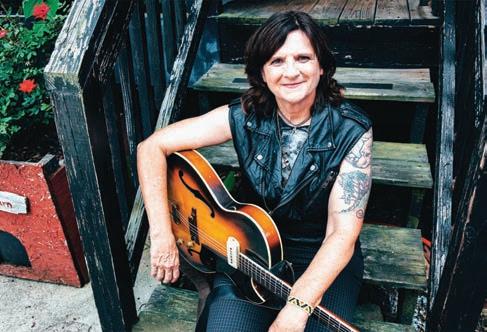
Whether out singer/songwriter Amy Ray is performing with longtime musical partner Emily Saliers as one half of the Indigo Girls, as she has since the mid-1980s, or going solo as she did with her solo debut “Stag” in 2001, you recognize her instantly. Her distinctive vocal style, which suits whatever genre she’s performing – folk, punk, Americana, or gospel – has become as much her trademark as the outspokenness of her lyrics.
“If It All Goes South” (Daemon), Ray’s exceptional seventh solo album is a welcome addition to her singular output, touching on themes of queerness and social issues, all performed in her warm and welcoming manner. Amy was gracious enough to make time to talk about the new album around the time of its release.
BLADE: Before we get to your new album “If It All Goes South,” I wanted to go back in time a little bit. Your 2001 solo debut album “Stag” and its 2005 follow-up “Prom” are firmly rooted in a punk rock/riot grrrl aesthetic. While the Indigo Girls are more than capable of rocking out, did you feel that the songs on those albums wouldn’t have been a good fit for what you do with Emily (Saliers)?
AMY RAY: Yes. I think it was because of two things. One was the collaborators. Those were people I’m a fan of, most of them are people that Daemon Records (Ray’s record label) had an association with, in some way or another. It was kind of like this other camp of people that were different from the collaborators that the Indigos would typically play with. It tended to be more studio accurate, in some ways. As opposed to that punk rock ethic which is music being from a different place, and accuracy maybe being less important than technical prowess.
BLADE: A little more DIY.
RAY: Yeah! And I also think the subject matter, the songs were just a little more singular in a way that was hard to do them as the Indigo Girls and not dilute the message. As soon as you get us together, we really shift the other person’s song, it becomes a duet. The subject matter to me was so specific and gender queer and punk rock edge that it didn’t feel like it would work. At that time, when I wrote (the song) “Lucy Stoners,” Emily wasn’t interested in doing some of those songs. She wasn’t down with the attitude. Now, she would say, I’m sure just knowing her, that [laughs] she’d do it now. Because her attitude has changed. I was hanging out with and influenced by people that were from that DIY movement, and there was lots of gender queer conversation. It was a different place than Emily was in as a gay person. Now, I look back on all of it and I think I was, all the time, reaching around to different collaborations because I love collaborating with different kinds of people. It always teaches me something. It’s also a different itch that I get scratch.
BLADE: In terms of trajectory, to my ear, your most recent three solo albums – 2014’s “Goodnight Tender,” 2018’s “Holler,” and the new one, “If It All Goes South” (Daemon) – in addition to being alphabetically titled, feel like an Americana trilogy. Do you consider them to be linked?
RAY: Yeah. I mean I didn’t say to myself, “This is the third one and then I’ll stop.” But “If It All Goes South” was definitely a record where there was a thread from the other ones and some things that I wanted to achieve that I didn’t feel like I was able
to do on the other ones. I think I didn’t even know that until we started making this one. This is more successful at combining a few of my punk-abilly influences into an Americana world. Also, some of that spontaneity we were starting to get on “Holler.” Now that we’ve played together as long as we have as a band, it was at its peak on this record. I think we just needed to make a couple of records to get to that place. I like them all, but for different reasons. They do different things for me. This one gathers up all the loose ends of “Holler” and “Goodnight Tender” musically and ties them up and puts them in a different context, and almost raises the bar. Lyrically, I wanted to have songs that were about healing, a “you’re not alone” kind of vibe, because of the time period that we had just been through. It’s also the same producer (Brian Speiser) on all three, and we’ve worked together on projects. It started off casually – “Hey, I’ve been wanting to do this country record with these songs. Let’s do this together.”
BLADE: Am I reading too much into the album’s title “If It All Goes South,” or is it a play on words, as in “goes south” as a direction and as deterioration?
RAY: You’re not reading too much into it. There’s even more you can read into it, politically. When I was writing (the song) “Chuck Will’s Widow,” Georgia was the epicenter of some big political movement. When Warnock got elected and Abrams declared running for governor again, I was like, “Oh man, I’m in the right place for once.” But we knew it wasn’t always going to be easy. My perspective in that song was a couple things. “If it all goes South, count it as a blessing, that’s where you are.” Yes, it’s directional, and also like, if things get really shitty, try to make the best of it, of course, it’s what you tell your kids all the time.
BLADE: As any Indigo Girls fan or follower of your solo output knows, you have a history of playing well with others, in addition to Emily (Saliers), “If It All Goes South” is no exception with guest vocalists including Brandi Carlile (“Subway”), H.C. McEntire (“Muscadine),” Allison Russell (“Tear It Down”), Natalie Hemby (“From This Room”), and the trio I’m With Her (“Chuck Witt’s Widow”). When you begin the recording process for an album do you have a wish list of musical guests or how does that work?
RAY: I usually have a wish list when I’m writing the song. Alison Brown, she’s part of the band, so I always think about her banjo playing when I’m writing. She doesn’t tour with us, but she’s in the band. I started writing “From This Room” a long time ago, and I started writing it as a duet. I didn’t have anybody in mind at that point, but I hadn’t finished it yet. When I was finishing it for the record, I had just seen Natalie Hemby with The Highwomen and had also just had met her and Emily writes with her sometimes. So, I knew her and I was thinking about her voice. When I wrote “Subway,” in part, in tribute to (the late DJ) Rita Houston, who had been so crucial. She and Brandi Carlile were super close. She really helped develop Brandi’s career in being such an indicator station, getting other people on board. So, I was thinking about Brandi and the chorus vocals that would be there because I was writing kind of an ambitious chorus for me [laughs]. I’m like, “I’m gonna have to have Brandi in here!” For “North Star,” that kind of gospel song at the end, when I wrote it and Jeff Fielder, the guitar player, and I were
demoing it, I was like, “This is not right. There’s another ingredient. I don’t know enough about the kind of music I’m trying to write to do it.” I got Phil Cook to come in, as a co-writer really, to finish the song musically. Fill out the chords and make it the gospel song I was trying to write. The only person I wanted to do this was Phil Cook. I am just very specific. Like Sarah Jarosz, on this record in particular I wanted to get a mandolin player and I wanted Sarah to play mandolin. We’re always covering the parts ourselves. Jeff’s a great mandolin player, but Sarah Jarosz is a fucking prodigy [laughs]. … It’s never like a wish list of, “Who’s famous? Who can we get?” It’s more a case of who are these songs geared towards, so that when they come into the studio, you don’t tell them anything, really. They just do what they do great, and it works.
BLADE: You mentioned the late, queer, influential WFUV DJ Rita Houston, and I was wondering what you think the loss of Houston means for new artists?
RAY: It’s a huge hole in the universe of people that would take a new artist and sort of help develop them, take chances at radio, and give people that space. She also was a mentor to artists. She wasn’t ever judging your art by whether you were gay or not, or what color your skin was. … She was a mentor in shared musicality. Being able to trust her and understanding how that taught you about the terrain that you’re in and who you can and can’t trust in that way.
BLADE: “Subway” ends with the line “This Georgia girl has got it bad for New York.” With that in mind, could there be an Amy Ray or Indigo Girls musical on Broadway at some point in the future?
RAY: [Big laugh] That’s Emily’s territory. She’s working on some things. A couple of different musicals, and I’m not working on them with her. She’s developing two different ones, and I think one of them has actually gotten some traction and some workshopping that’s pretty important. There is a musical that a friend of mine from high school has been writing that’s really interesting and it’s gotten a lot of workshops. It’s still in the early stages. It uses Michelle Malone’s music and my solo music. Then there’s a movie coming out called “Glitter and Doom” which is a movie musical that’s just Indigo Girls music. It’s coming out next year, I think. We’re still working on the final credits song.
BLADE: After the current Indigo Girls tour wraps up, is there a possibility of an Amy Ray solo tour?
RAY: Yeah. We’re booking dates in February for the South. I’ve tried touring in cold places in February, and it’s hard [laughs]. We’ll head up to the North in May.
One of the joys of great movies – as any real cinema buff can surely attest – is the ability to revisit them through a new set of eyes. Though the images they show us are frozen, unchanging from the day they were first captured, you the viewer and the world you live in are different each time you watch them.
This shift in perspective becomes even more apparent when the movie in question is a film you haven’t seen in many years. There’s a risk involved, of course: re-watching a favorite, you may find it doesn’t live up to your fond memories; alternatively, you could discover previously unappreciated layers that make you love it even more than you did before. Either way, you’re likely to experience the movie as if it were completely new.
Sometimes, though, the power of a movie over time can be deepened by just how much watching it feels the same – and that’s why queer filmmaker Todd Haynes’ “Far From Heaven,” which turns 20 years old this month, speaks even louder to us now than it did in 2002.

Even then, of course, it was a look back at a faraway past. Set in the upper-middle-class world of Hartford, Conn., in the late 1950s, it transported us into a seminal period of our history and forced us to take stock of just how much things have changed – and just how much they haven’t – in our own time.
Borrowing more than a page from the glossy Technicolor melodramas of the era in which it takes place – in particular, the work of Douglas Sirk, a German immigrant whose outsider’s eye tinged the soapy escapist films he directed with a subtle undercurrent of social criticism that would only come to be appreciated by a later generation – “Far From Heaven” is both a painstaking homage to a classic genre and a merciless deconstruction of American identity.
Awash in rich fall colors and adorned down to the smallest detail with pristine replication of the period’s iconic clothing, architecture, décor, and automobiles, its aesthetic – breathtakingly beautiful from start to finish – was accomplished by team effort. Haynes wrote a screenplay ripe with the familiar over-the-top style of the vintage films he wanted to recreate and directed with an eye toward emulating the visual conventions – framing, cam era angles, editing choices – with which they were composed, even to the point of using old-fashioned rear projection process shots for driving scenes; cinematographer Edward Lachman captured it all on film utilizing the same lens filters and lighting techniques used in the originals; Elmer Bernstein, who composed the music for many of the same classics that inspired the film, envelops the narrative the lush romantic strains of his final major movie score, adding an even more tangible layer of authenticity to the package; and an impeccable cast of gifted screen actors, led by Julianne Moore in a performance that won her the Volpi Cup for Best Actress at the Venice Film Festival (and should have won her an Oscar, according to many awards-show pundits who consider her loss to Halle Berry in “Monster’s Ball” one of the Academy’s most egregious snubs), play out the drama with all the skill required to honor the movie’s mise-en-scène while still making each moment feel palpably real.
Yet as impressive as the film is as a technical achievement in style, it’s not defined by that measure alone. Rather, the style functions entirely in service of a larger goal, in which the myth of “the good old days” is lavishly rendered onscreen only to be torn down by a narrative that asserts all the reasons why they weren’t so good after all.
First and foremost, our identification is imprinted upon Moore’s character, Cathy Whitaker, a housewife living within a picture-perfect existence as the dutiful homemaker and wife. Her husband, Frank (Dennis Quaid), is a higher-echelon executive at a television manufacturing company – the 1950s equivalent, perhaps, of a tech bro – whose paycheck she spends in the daily running of the household she shares with him and their two young children, a job made considerably easier by the presence of hard-working housekeeper Sybil (Viola Davis); her copious personal time is filled with the obligatory demands of her class position – organizing fundraisers, car-pooling kids to after-school functions, and planning parties designed as much to show off her family’s position of status and privilege as for anything else. Her idyllic existence, however, is about to be disrupted.
Frank, as she discovers in the most awkward way imaginable, turns out to have long-repressed homosexual desires, upon which he has begun acting by delving into the hidden underground world of closeted 1957 queer life and which have put an even greater emotional distance into their already-perfunctory marriage. At the same time, she herself begins a friendship with her Black gardener, Raymond (Dennis Haysbert), a widowed father raising a daughter on his own while operating a successful landscaping business serving the prosperous white community. Naïve but good-hearted, she clings to the hope that psychological treatment can “cure” her wayward husband, while denying her own feelings toward Raymond and remaining willfully dismissive of the stigmatizing gossip that sweeps her social circle – even her closest friend (Patricia Clarkson), whose loyalty ends up extending only as far as her own prejudices will allow – about the nature of their relationship. Even in a real 1950s melodrama, she would be in for a hard lesson.
That lesson might be entirely predictable from our contemporary point-of-view – our knowledge of the pernicious influence of homophobia and racism on those who dared to veer from the heteronormative path proscribed and enforced by the social order of our past is firmly established enough to foresee exactly how wrong things will go on both of these fronts – but what makes it resonate with modern audiences has nothing to do with any expectation of a happy ending.
Instead, the power of “Far From Heaven” lies in the uncomfortable realization that sexuality and race are still, decades later, a great divider within the American social order. Haynes – who rose to prominence as one of the architects of the “new queer cinema” of the ‘90s by exploring the traumatic memories of Boomer childhood in films that questioned the then-dominant assumptions of established norms – crafts his film with a heightened reality that feels more like a sedative-induced hallucination than a tranquil dream; in paying tribute to the films that influenced his youth, he re-imagines them through the lens of hindsight, revealing the “American Dream” that reinforced our preconceived assumptions about the “natural order” of things to be nothing more than a cruel and manipulative lie more likely to prevent our happiness than enable it. That message, clear two decades ago, now rings truer than ever.
In 2002, it was a quietly devastating assertion that only the privileged few had reason to look back fondly on mid-20th-century life in our country. In 2022, in the wake of a disastrous conservative push to “make America great again” by regressing to the strictures of a long-tarnished fantasy, it’s a chilling reminder of just how much we have to lose.
Years ago, a colleague videotaped me as I apol ogized for bumping into a desk. “I’m sorry,” I said to this inanimate object, “I hope I didn’t hurt your feelings.”
If you’re terminally po lite, love kick-ass movies and worship bad-asses, you’ll lap up “Dying of Po liteness: A Memoir” by badass, feminist, Acade my-Award-winning actor and activist Geena Davis.
In the memoir (Davis’s debut as an author), Da vis, 66, tells entertaining, sometimes moving, sto ries about her wide-rang ing life: from her childhood (her parents were more polite than Emily Post ever dreamt of) to her acting career to finishing in 24th place in archery in the 2000 Summer Olympics trials.
By KATHI WOLFEreal life,” Davis writes.
But, “Dying of Polite ness” is a more than apt title for the memoir. Her parents were loving, but polite to the point of ab surdity.
They insisted that Davis say “no thank you, I’m not thirsty” “even if someone was handing me an al ready poured glass of ice water,” Davis writes.
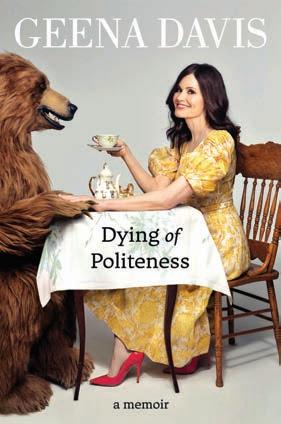
Davis, a queer and feminist icon, has been in many movies. Her awards include an Oscar for best supporting actress for her portrayal of dog trainer Muriel Prichett in “The Acciden tal Tourist,” the adaptation of the Anne Tyler novel of the same name. Davis watched her boyfriend (Jeff Goldblum) turn into an insect in “The Fly” and played Barbara in the come dy-horror picture “Beetlejuice.”
Davis is loved by LGBTQ folk for her work in two 1990s classics.
In 1991, she was Thelma (Susan Sarandon was Louise) in “Thelma and Louise,” the clas sic film that made many women cheer and a lot of men squirm.
Just a year later, Davis was Dottie in the movie that’s still a fave of hetero and queer girls and women — “A League of Their Own.” Unlike the series with the same name recent ly released by Amazon Prime, the film has no explicitly queer characters. But with Madonna (Mae) and Rosie O’Donnell (Doris), the picture has a fab queer quotient.
You’d think, after watching Davis as Thelma and Dottie, that the Oscar-winning actor leapt from her mother’s womb as a badass.
But it’s clear from the get-go that it took more than a minute for Davis to emerge as her badass self. Davis could easily have titled not only the first chapter of her memoir, but the entire book, “My Journey to Badassery.”

“I kicked ass onscreen way before I did so in
One of Davis’s childhood memories was of the time her 99-year-old great-un cle drove her and her family to his house. The relative kept veering into the oncoming “if blessed ly empty,” traffic lane, she recalls. Rather than saying anything, “my parents sim ply moved me to the spot between them on the back seat,” Davis writes, “think ing, I presume, that when the inevitable head-on collision occurred, I’d be killed a little less in the middle.”
The humor in this anecdote of a childhood brush with death is typical of the wit sprinkled throughout “Dying of Politeness.”
Davis, who grew up in Wareham, Mass., decided at age 3 that she wanted to be in the movies. After studying acting at Boston Uni versity, Davis left college and moved to New York.
Davis may have been as she writes, “a crip plingly polite New Englander,” but she wasn’t lacking in chutzpah.
In New York, Davis worked as a Lord and Taylor sales clerk. On a dare, she joined a group of mannequins in a café scene in the department store window. Soon, people lined up to watch her perform in street theater.
Davis got her first movie role in “Tootsie” after Sidney Pollack saw her pictures in the Victoria’s Secret catalogue. Dustin Hoffman, starring in the movie, mentored her. He told her not to sleep with her co-stars.
The memoir is more than entertaining. Davis writes of sexual harassment, her effort to create inclusion in Hollywood by founding the Geena Davis Institute on Gender in Media and how her dad cared for her mom when she had dementia.
It’s hard to think of a timelier book than “Dying of Politeness” in our current political climate. Badassery is needed now more than ever.
Geena Davis kicked ass onscreen long before she did in real life
NEW AUTHORS WANTED! Page Publishing will help you self-publish your own book. FREE author submission kit! Limited offer! Why wait? Call now: 1-855-667-0380

Become a Published Author. We want to Read Your Book! Dorrance Publishing-Trusted by Authors Since 1920. Book manuscript submissions currently being reviewed. Comprehensive Services: Consultation, Production, Promotion and Distribution. Call for Your Free Author`s Guide 1-877-538-9554 or visit http://dorranceinfo.com/Cali
Prepare for power outages today with a GENERAC home standby generator. $0 Money Down + Low Monthly Payment Options. Request a FREE Quote -Call now before the next power outage: 1-844-4395645

Eliminate gutter cleaning forever! LeafFilter, the most advanced debris-blocking gutter protection. Schedule a FREE LeafFilter estimate today. 15% off Entire Purchase. 10% Senior & Military Discounts. Call 1-855-424-7581
Switch and save up to $250/year on your talk, text and data. No contract and no hidden fees. Unlimited talk and text with flexible data plans. Premium nationwide coverage. 100% U.S. based customer service. Limited time offer get $50 off on any new account. Use code GIFT50. For more information, call 1-844-908-0605
WANTED!
Old Porsche 356/911/912 for restoration by hobbyist 1948-1973 Only. Any condition, top $ paid! PLEASE LEAVE MESSAGE 1-707-339-5994. Email: porscherestoration@yahoo.com
DONATE YOUR CAR TO KIDS Fast Free Pickup – Running or Not - 24 Hour Response - Maximum Tax Donation – Help Find Missing Kids! Call 1-888-491-1453.
DONATE YOUR CAR OR TRUCK TO HERITAGE FOR THE BLIND. Free 3 Day Vacation, Tax Deductible, Free Towing, All Paperwork Taken Care Of. CALL 1-844-491-2884
DIRECTV for $79.99/mo for 12 months with CHOICE Package. Watch your favorite live sports, news & entertainment anywhere. First 3 months of HBO Max, Cinemax, Showtime, Starz and Epix included! Directv is #1 in Customer Satisfaction (JD Power & Assoc.) Some restrictions apply. Call 1-888-641-5762
COMPUTER & IT TRAINING PROGRAM! Train ONLINE to get the skills to become a Computer & Help Desk Professional now! Grants and Scholarships available for certain programs for qualified applicants. Call CTI for details! 1-877-806-0935 (M-F 8am-6pm ET). Computer with internet is required.













Over $10K in Debt? Be debt free in 24 to 48 months. No upfront fees to enroll. A+ BBB rated. Call National Debt Relief 1-888-231-4274.


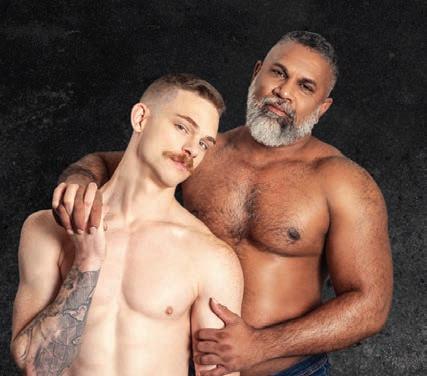
SAVE BIG on HOME INSURANCE! Compare 20 A-rated insurances companies. Get a quote within minutes. Average savings of $444/year! Call 1-844-410-9609!
(M-F 8am-8pm Central)

RETIRED COUPLE
$1 MIL for business purpose Real Estate loans. Credit unimportant. V.I.P. Trust Deed Company www.viploan.com Call 1-818-2480000 Broker-principal DRE 01041073. No Consumer Loans.
FREON WANTED: Certified buyer looking to buy R11, R12, R500 and more. Call Joe at 312-697-1976.
TOP CA$H
GUITARS! 1920-1980 Gibson, Martin, Fender, Gretsch, Epiphone, Guild, Mosrite, Rickenbacker, Prairie State, D’Angelico, Stromberg. And Gibson Mandolins / Banjos. 1-844-910-1960.
7 IN 10 Americans or 158 million U.S. Adults read content from newspaper media each week? Discover the Power of Newspaper Advertising. For a free brochure call 916-288-6011 or email cecelia@cnpa.com
The difference in winning and losing an election is how campaign dollars are spent. Get the best ROI by using our deep relationships in every community in California. Our on-the-ground knowledge is indispensable to campaigns that want results. For more info on multi-market ethnic and non-ethnic solutions call Cecelia @ (916) 288-6011 or cecelia@cnpa.com

